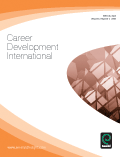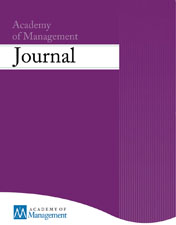Academic articles
Practitioner articles
Working papers
Books
Book chapters
Case studies
Other publications
Subject(s)
Information technology and systems; Technology, R&D management
Keyword(s)
information technology, IT security law, cybersecurity, European regulation
Volume
52
Journal Pages
105927
ISSN (Online)
1873-6734
ISSN (Print)
0267-3649
Subject(s)
Strategy and general management; Technology, R&D management
Keyword(s)
alliance termination; disintegration, innovation strategy, open innovation closure, relationship dissolution, tie dissolution
ISSN (Online)
2688-2639
ISSN (Print)
2688-2612
Subject(s)
Human resources management/organizational behavior
Keyword(s)
regret, career regret, career decision, career experiences, career inaction
JEL Code(s)
M12
Although the topic of career regrets is of interest both to research and practice, the scholarly development of this field is still rather nascent. In particular, the knowledge about the occurrence and development of career regrets remains to be limited. Drawing on the qualitative data collected through individual reflections (N=50) and semi-structured interviews (N = 22), we explore the nature of an individual’s career regrets and how a career decision becomes a regret. Our findings suggest a broader understanding of career regrets that spreads beyond regrets that are tied to occupational choices. In line with this broad understanding of career regrets, we develop a framework of a career decision becoming a career regret. Our findings also show that when people reflect on career decisions in terms of how they should have behaved differently, there are some that they perceive as career regrets while others take a form of career mistakes or career realizations. We distinguish these different ways of viewing career decisions, suggesting that the latter two kinds of decisions are more influential in shaping an individual’s future career decisions than career decisions that are career regrets. Our research has important theoretical and practical implications concerning career regrets.
With permission of Emerald
Volume
31
Journal Pages
57-81
Subject(s)
Economics, politics and business environment; Ethics and social responsibility; Finance, accounting and corporate governance
Keyword(s)
ESG, GCC, corporate sustainability, stock returns, reverse causality
Volume
2
ISSN (Online)
2993-1282
Subject(s)
Diversity and inclusion; Human resources management/organizational behavior
Keyword(s)
network cognition, social network recall, structural holes, gender
Volume
78
Journal Pages
641-657
ISSN (Online)
1744-6570
ISSN (Print)
0031-5826
Subject(s)
Economics, politics and business environment
Keyword(s)
model of sales, captives, shoppers, price dispersion, clearinghouse models
JEL Code(s)
D43, L11, M3
We study a Bertrand oligopoly with asymmetric costs in which each seller has some “captive” buyers. In the limit as captive buyers vanish, the lowest-cost firm sells to all buyers at a price equal to the second-lowest marginal cost. However, the closest competing price arises from non-degenerate mixed strategies, firms play exclusively undominated strategies, and with positive probability all but one firm sets the monopoly price.
With permission of Elsevier
Volume
257
Subject(s)
Human resources management/organizational behavior
Keyword(s)
Employer attractiveness, product relevance, product novelty, product innovation, meaningful work, internal employer branding, employee perception
Volume
22
ISSN (Online)
1613-9615
ISSN (Print)
1613-9623
Subject(s)
Entrepreneurship; Marketing; Strategy and general management
Keyword(s)
fear of losing face, radical innovations, new products, innovation selling
JEL Code(s)
M00, L60
With permission of Elsevier
Volume
130
Journal Pages
74-91
Subject(s)
Strategy and general management; Technology, R&D management
Keyword(s)
Categorical Imperative, category contrast, entry, entrepreneurship, strategy, de novo organizations, de alio organization
We hypothesize that “low-contrast categories” (those lacking sharp differentiation from adjacent categories) catalyze the creation of groundbreaking inventions by influencing two key stages in the life of an invention: (1) idea-creation and (2) idea-positioning. During “idea-creation,” low-contrast categories increase the likelihood that descendant inventions will combine the focal invention with more (a) boundary-spanning, (b) novel, (c) original, and (d) atypical knowledge inputs. During “idea-positioning,” they allow greater leeway in articulating how descendant inventions depart from the focal invention’s lineage and chart new technological directions. We find robust support for our hypothesis using data from the United States Patent and Trademark Office’s classification system spanning nearly four decades. Further analyses demonstrate that the catalyzing effect of low-contrast categories has important material consequences: inventions classified in low-contrast categories spur descendant inventions that generate substantially higher economic value and exert more enduring technological impact than those in high-contrast categories. By introducing the concept of catalyzing categories, this study offers a novel theoretical perspective on the genesis of groundbreaking inventions and the role of categorical structures in the inventive process.
With permission of the Academy of Management
Subject(s)
Finance, accounting and corporate governance
Keyword(s)
private equity, hospital acquisitions, employment, operational efficiency, real patient outcomes, hospital prices
We examine the survival prospects, employment profiles, and patient outcomes at private equity (PE)-acquired hospitals. Target hospitals maintain their survival rates while significantly reducing employment and wage expenditures. The number of core medical workers drops temporarily, but returns to its pre-acquisition level in the long run. However, administrative job and wage cuts persist over the long term, particularly at previously nonprofit hospitals. Using proprietary insurance claims data, we find no significant changes in patient demographics or inpatient prices at PE-acquired hospitals. While patient satisfaction declines, there is no evidence of increased patient mortality or readmission rates at PE-acquired hospitals.
with the permission of Elsevier
Volume
171


